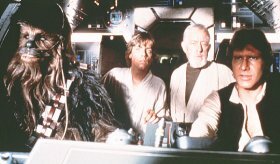|
|
| Tookey's Review |
|
| Pro Reviews |
|
| Mixed Reviews |
|
| Anti Reviews |
|
| Cast |
|
| |
 |
| |
| Released: |
1977 |
| |
|
| Genre: |
ACTION
UNDERRATED
ADVENTURE
SERIES
SCIENCE FICTION
IMPORTANT
FAMILY
|
| |
|
| Origin: |
US |
| |
|
| Colour: |
C |
| |
|
| Length: |
121 |
|
| |
|
| |
|
|
| |
|
Young man (Mark Hamill) saves galaxy and princess (Carrie Fisher) with help of assorted humans, aliens and robots.
|
Reviewed by Chris Tookey
|
|
One of the most popular and profitable movies of all time, Star Wars was the first big hit to use computer animation; the first big science fiction hit since 2001: A Space Odyssey; and its huge success sparked a revived interest in making films with a strong narrative.
|
| In the mid-Nineties, writer-director-producer George Lucas and Twentieth Century Fox spent millions of pounds improving the sound and special effects of the trilogy, even adding new scenes. Some fans of the original were outraged, claiming that Lucas is tampering with their childhood memories, but the re-released Star Wars was a huge commercial success - and no wonder. One of the best sci-fi films of all time was back, and it really did look and sound better than ever. |
| The story remains unchanged - of how an unassuming, uncommitted backwoodsman is encouraged by a mysterious old man to join forces with a motley collection from various races to defeat the forces of darkness. It’s basically the same plot which Tolkien used in The Lord of the Rings , but George Lucas had the wit to see its potential as science fiction. |
| In 1977, the film flew in the face of cinematic fashion, not least for its straightforward view of right versus wrong - simplistic, but a breath of fresh air after the moral uncertainties of the Sixties and early Seventies. |
| Though criticised on release for cartoonish characters and bad acting, Harrison Ford is very much a star as the film’s anti-hero, Han Solo, who learns that being handsome and solo isn’t everything. Alec Guinness adds necessary authority as Obi-Wan Kenobi. The baddies, led by horror veteran Peter Cushing and James Earl Jones as the voice of Darth Vader, are genuinely menacing. |
| Carrie Fisher is sparky as the princess, even if her hairstyle does make her look as though she’s listening to the dialogue through headphones. Even the much-maligned Mark Hamill is adequate as the Candide-like innocent abroad - and, best of all, there are the robot R2D2 and android C3PO to act as a space-age Laurel and Hardy. |
| Though a technical trailblazer in its day, Star Wars was produced on a shoestring budget, and before recent advances in electronic technology. Compromises were made, and these have now been rectified with considerable skill. |
| The original Star Wars soundtrack wasn’t even in stereo. Vastly more impressive sound adds to the excitement of the space battles, and maximises the impact of John Williams’s terrific score, a cinematic landmark for the way it brought symphonic film music back into fashion. |
| For the 1997 Special Edition, there was one wholly new scene (shot in the Seventies, but not included because the special effects let it down) between Han Solo and the character to whom he owes money, Jabba the Hutt. There are new monsters, to make use of technology which was perfected by Lucas’s technicians twenty years on, in Jurassic Park. |
| Most of all, there’s an enrichment of the visual detail and atmosphere. The space port with its notoriously seedy bar becomes a much more densely populated place which reeks of danger. |
| Some critics have blamed Star Wars for ending a so-called “golden age” of American cinema which created intelligent, politically committed movies like Nashville and Five Easy Pieces. Oddly enough, though, it is those films - not Star Wars - which look dated today. |
| The more morally conservative, narrative-based movies of Lucas and his colleague Steven Spielberg (who went on to collaborate as producer and director on the Indiana Jones trilogy) are equally intelligent and far more timeless. Most importantly, they reinvigorated mass interest in the cinema, and reversed film’s seemingly inevitable decline into being a minority art-form. |
| Star Wars always was an exciting, uplifting experience. The Special Edition improved it still further, and even critics found it easier to love. |
| The film won Oscars for its score (John Williams), art direction (Jonathan Barry, Norman Reynolds, Leslie Dilley, Roger Christian), costume design (John Mollo), sound (Don MacDougall, Ray West, Bob Minkler, Derek Ball), editing (Marcia Lucas, Paul Hirsch, Richard Chew) and visual effects (John Stears, John Dykstra, Richard Edlund, Grant McCune, Robert Black). |
| "Acting in Star Wars, I felt like a raisin in a gigantic fruit salad." |
| (Mark Hamill) |
| “You can type this shit, George, but you sure can’t say it.” |
| (Harrison Ford during production, to George Lucas) |
| “The title Star Wars was an insurance policy. We calculated that there are something like $8 million worth of science fiction freaks in the USA and they will go to see absolutely anything with a title like Star Wars.” |
| (George Lucas) |
|
|
|
|

